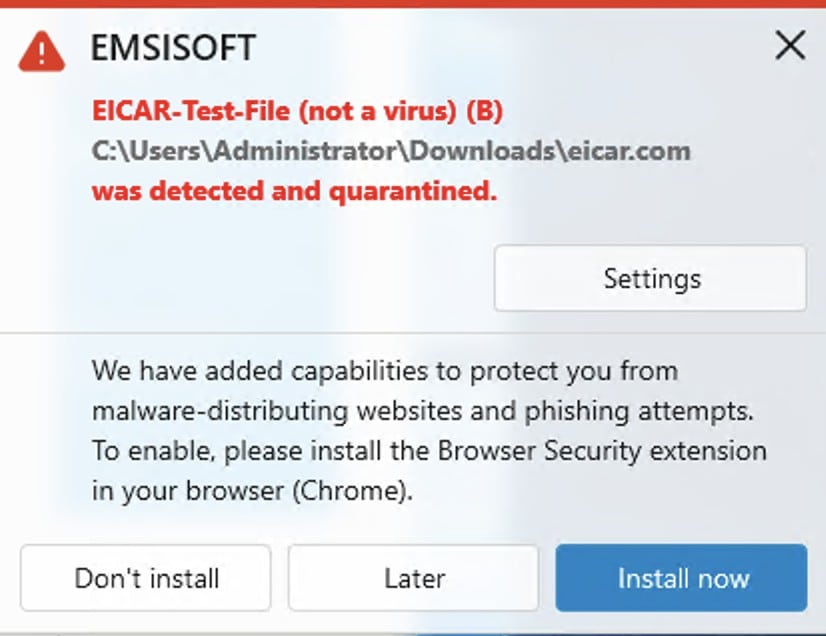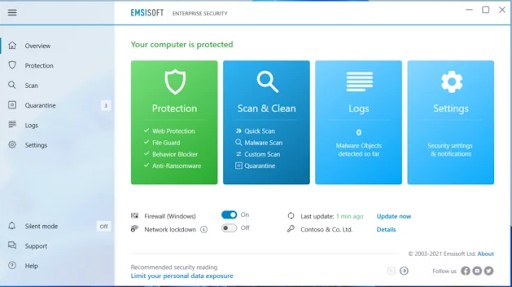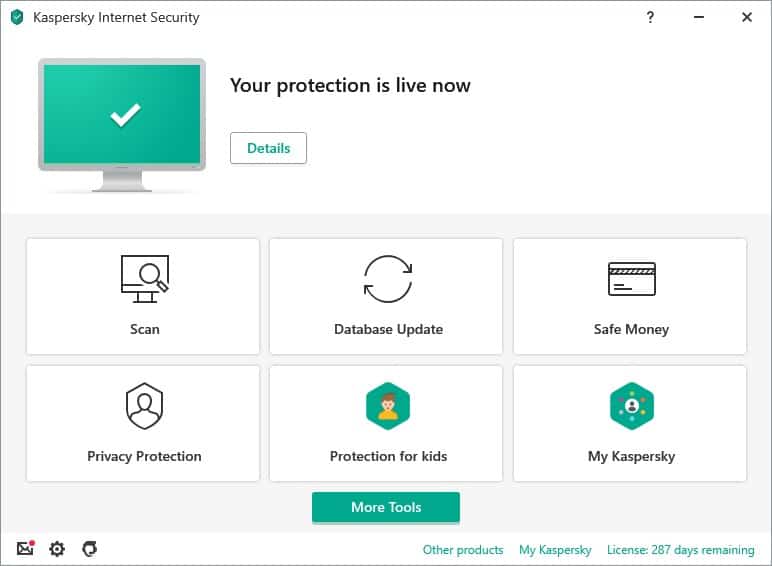How effective are Emsisoft and Kaspersky at protecting your device? The answer will be revealed throughout this comparison. To see how successful Emsisoft and Kaspersky are, I’ll run two major malware tests on my PC to see how effectively the apps stop infections in real-time and on-demand.
While malware prevention is critical, it is not the only element to consider. I’ll also evaluate performance and speed, as well as the software’s simplicity of use and the additional features provided by each supplier. I’ll also consider customer service and cost to determine which antivirus is the best overall.
Do you need the outcome right away? While it was a competitive race between two good solutions, Kaspersky outperformed Emsisoft in terms of a total package. It delivers powerful virus protection and a fantastic value for customers.
See the entire breakdown below for the full specifics of everything I uncovered on Emsisoft and Kaspersky.
Summary: Emsisoft vs Kaspersky
Emsisoft
- Secure browser
- Two malware scanning engines
- Protection against ransomware
Kaspersky
- Ransomware protection
- Banking protection
- File backup (PC)
| Feature | Emsisoft | Kaspersky Total Protection |
|---|---|---|
| Antivirus and antispyware | ✔ | ✔ |
| Firewall | ✔ | ✔ |
| Webcam protection | ✖ | ✔ |
| Password manager | ✖ | ✔ |
| Anti-phishing | ✔ | ✔ |
| Ransomware protection | ✔ | ✔ |
| Banking and payment protection | ✖ | ✔ |
| Parental control | ✖ | ✔ |
| Network attack protection | ✔ | ✔ |
| Encrypted storage | ✖ | ✖ |
| Automatically update apps | ✔ | ✖ |
| VPN | ✖ | ✖ |
| PC cloud backup | ✖ | ✔ (On PC) |
| File shredder | ✖ | ✖ |
| Performance optimization | ✖ | ✖ |
| Identity theft protection | ✖ | ✖ |
| Run suspicious apps in sandbox | ✖ | ✖ |
BEST DEAL FOR EMSISOFT:Get Emsisoft for just $29.99 per year and protect every device at home.
BEST DEAL FOR KASPERSKY:Up to 50% off all Kaspersky packages starting as low as $23.99 per year.
Background
Emsisoft is well-known for its antivirus software as well as for decrypting ransomware assaults launched by hackers. According to the company, around one million people download its software each year. Emsisoft has been gradually growing its user base since 2003, from its New Zealand headquarters.
Kaspersky Lab was established in Russia in 1997. After 25 years in business, Kaspersky has grown to become one of Europe’s largest antivirus businesses, protecting over 400 million consumers.
The organization is well-known for its cybersecurity expertise, and it collaborates with companies like Microsoft to explore new and emerging malware threats.
Emsisoft vs Kaspersky pricing
Emsisoft’s software has no free or premium versions. It delivers a universal package to serve all of its home customers. Emsisoft Anti-Malware Home protects one, three, or five devices.
| Emsisoft Anti-Malware Home - 1 Windows device | Emsisoft Anti-Malware Home - 3 Windows Devices | Emsisoft Anti-Malware Home - 5 Windows Devices | Emsisoft Mobile Security - 1 devices | Emsisoft Mobile Security - 3 devices |
|---|---|---|---|---|
| $29.95 (GBP £22.61) per year | $49.95 (GBP 37.70) per year | $69.95 (GBP £52.80) per year. | $10.00 (GBP £7.54) per year | $16.67 (GBP £12.58) per year |
Emsisoft only covers Windows, therefore you’ll need to subscribe to the extra Emsisoft Mobile Security plan to secure an Android device. Apple devices are not covered by the desktop or mobile software, therefore MacOs and iOS users must go elsewhere for security.
Emsisoft costs $29.95 per year for a single PC, which is approximately half the price of Kaspersky’s entry level bundle.
The three and five device choices from Emsisoft cost $49.95 and $69.95, respectively. There are no first-year discounts available now, but buying two or three years of coverage will save you money. Emsisoft Mobile Security costs $10.00 for one device and $16.67 for three.
Kaspersky Anti-Virus
This antivirus software from Kaspersky includes anti-phishing capabilities and real-time security to keep you safe from scammers. It also includes performance optimization tools.
Kaspersky Internet Security
On top of everything already included in the Kaspersky Anti-Virus package, this tier of the Kaspersky product line adds a significant number of new features and functions. There are a variety of options provided, like a VPN, webcam protection, screen control tools, payment security, and more.
Kaspersky Total Security
Total Security is a more costly solution that includes everything in the other suites as well as some useful supplementary features that are not found in the other suites. Among the features is a GPS kid locating tool, file security, and a password manager, to name a few.
Kaspersky Security Cloud Personal
Security Cloud Personal enables consumers to personalize their security package by choosing from a variety of options. Depending on their requirements, users may opt to install all of the bundled programs and features or just those that are relevant to their needs.
This suite offers three additional premium features that are not available in the others: a service that checks your account for Netflix, Facebook, and other well-known platforms to see whether hackers have your email address, a home network monitor, and a hard disk health monitor.
| Kaspersky Security Cloud | Kaspersky Antivirus | Kaspersky Internet Security | Kaspersky Security Cloud | Kaspersky Total Security - 5 devices |
|---|---|---|---|---|
| Free | $59.99 (GBP £44.28) per year | $79.99 (GBP £59.04) per year | $89.99 (GBP £66.42) per year | $99.99 (GBP £73.81) per year |
Kaspersky is offering a substantial $50 (GBP £36.91) discount on its Total Security suite at the time of writing. For the first year, the total price is reduced to $49.99, saving you money.
If you’re looking at protecting more than just a Windows PC, Kaspersky is the only option here as it works on Windows, Mac, iOS, and Android devices.
Effectiveness against malware
How do Emsisoft and Kaspersky compare in terms of malware protection? How effective is the live scanner in identifying viruses in files that have been downloaded from the internet? Do on-demand scans disclose any viruses that may be present on the computer’s hard disk?
I developed a series of tests in order to find out more. This involves downloading four EICAR (European Institute for Computer Antivirus Research) sample files as well as three malicious programs that are used to disguise infections such as trojans and adware on the user’s computer.
Real-time scanning results
First, I attempted to download the four EICAR sample files in order to see how the real-time scanner detected and deleted them, or whether it even allowed the download to take place.
All EICAR test files were rejected by Emsisoft when they were downloaded, with the exception of the text file, which was not recognized when it was pasted to a text document and saved.
The live samples were identified either during the download attempt or during the extraction of the ZIP folder.
| Test File | EICAR Sample 1 | EICAR Sample 2 | EICAR Sample 3 | EICAR Sample 4 | Live Sample 1 (Adware) | Live Sample 2 (Trojan) | Live Sample 3 (Trojan) |
|---|---|---|---|---|---|---|---|
| Emsisoft | Blocked | Allowed | Blocked | Blocked | Blocked | Blocked | Blocked |
| Kaspersky | Blocked | Blocked | Blocked | Blocked | Blocked | Detected | Detected |
The results of the identical test performed using Kaspersky’s software are shown in the table above.
Everything was successfully found and stopped by the software in real-time; no EICAR samples were permitted, and live samples were removed from the system immediately once they were unlocked and extracted from the zip archive.
On-demand scans
When I ran the on-demand scanner, I was able to observe how effectively Kaspersky and Emsisoft performed in detecting and removing malware that was already on the PC or that had been added through an external hard drive or a USB drive.
For this test, I turned off the antivirus’s real-time scanning capability so that I could download the EICAR and live samples to my device without interruption. Afterward, I ran a quickscan before doing a complete scan in order to record the findings.
I ran the quickscan, which is intended to quickly scan just the most obvious areas of your computer’s hard drive. Kaspersky’s rapid scan took 273 seconds to complete, while Emsisoft’s took just 22 seconds. Emsisoft’s quick scan detected no threats. Despite the fact that the fast scans for both vendors were swift, neither of them discovered any malware. This is not unusual; in fact, most previous quickscan tests I’ve performed with different antivirus applications have failed to detect malware.
The complete scans performed on demand were more successful. The total system malware scan performed by Emsisoft was quick but restricted, taking just 22 minutes to complete, which is much less time than most other antivirus scanners. During the period it was in operation, Emsisoft analyzed a total of 73,071 files. Some, but not all, of the malicious files were found by Emsisoft during a thorough on-demand scan conducted by the software.
Probably the biggest negative was Kaspersky’s time-consuming full scan, which took 3 hours and 47 minutes to complete and included scans of over 2.1 million files.
When it comes to the thoroughness of its scans, Kaspersky was the clear winner. Emsisoft scanned just 73,071 items and took only 2 minutes to complete the task.
| Test Type | Full Scan Time (minutes) | Full Scan # Items Scanned |
|---|---|---|
| Kaspersky | 227 | 2100000 |
| Emsisoft | 2 | 73071 |
After that, I looked at the results of the most recent independent antivirus lab tests to see how well Emsisoft and Kaspersky fared against a broader range of viruses.
AV-Comparatives
The AV-Comparatives Real World Protection Test was last conducted between July and October of 2021.The test pitted 17 different antivirus software providers against a set of 743 internet-based dangers.
Kaspersky was able to protect against 99.9 percent of the threats. The test also tracks false positives. When an antivirus program flags a file as a potential threat when it is actually harmless, this is known as a false positive. Kaspersky identified none.
Emsisoft was not evaluated during that same time frame, and the most recent AV-Comparatives Real World protection test data on the company is from November 2018, including 230 virus test instances. Emsisoft measured a 99.1 percent result in the test while scoring zero false positives.
The Malware ProtectionTest evaluates how well each antivirus application detects threats that are already present on the hard drive of a device rather than being downloaded from the internet.
10,020 recent and prevalent malware samples were utilized in the most recent malware protection tests, performed in September 2021.
Kaspersky had an offline detection rate of 84.7 percent, an online detection rate of 87.6 percent, and an online protection rate of 99.90 percent. During the test, it generated two false alarms.
Emsisoft was not included in the malware protection tests.
AV-Test Results
The most current test data from AV-Test comes from the months of September and October 2021. Kaspersky Lab’s ability to handle 0-day real-world threats were tested with 407 malware samples in September and October, and the company got a flawless score. Another test was conducted using 18,521 samples to see how well the software performed against prevalent malware that had been discovered in the preceding four weeks.
During the months of September and October, Kaspersky delivered complete protection.
The most recent time Emsisoft was put through its paces was in November and December 2016. It got a score of 99 percent in November of that year, and a score of 98.7 percent in December of that year, respectively.
In my testing and those of other labs, it’s clear that although Emsisoft is a competent antivirus, Kaspersky gives near-perfect protection.
Impact on PC performance
How do Emsisoft and Kaspersky’s real-time scanners affect PC performance? How much does a comprehensive system scan influence performance? Do either slow down your PC or interfere with your daily tasks?
I ran various experiments to find out the quickscan impact on system resources. The results are displayed below.
| Test Type | Control CPU Utilization % (no scan) | Control Memory Utilization % (no scan) | Control Disk Utilization (MB/s) (no scan) | Quick Scan CPU Utilization % | Quick Scan Memory Utilization % | Quick Scan Disk Utilization (MB/s) | Quick Scan Time (seconds) |
|---|---|---|---|---|---|---|---|
| Emsisoft | 7 | 36 | 7 | 32 | 37 | 8 | 22 |
| Kaspersky | 46 | 70 | 12 | 71 | 73 | 531 | 273 |
Emsisoft detects a 25 percent increase in CPU use, a one percent rise in memory usage, and an 1 MB/s increase in disk usage during a short scan. Kaspersky’s CPU use jumped 25 percent, memory usage 3 percent, and disc usage increased from 12 to 273 MB/s.
After that, I made a note of the impact of a complete system scan on the system’s resources. The results are in the table below.
| Test Type | Control CPU Utilization % (no scan) | Control Memory Utilization % (no scan) | Control Disk Utilization (MB/s) (no scan) | Full Scan CPU Utilization % | Full Scan Memory Utilization % | Full Scan Disk Utilization (MB/s) |
|---|---|---|---|---|---|---|
| Emsisoft | 9 | 65 | 31 | 39 | 72 | 170 |
| Kaspersky | 46 | 70 | 12 | 100 | 76 | 316 |
Emsisoft’s full scan revealed a 30 percent increase in CPU use, a 7 percent increase in memory usage, and a 170 MB/s increase in disk usage. Emsisoft’s full scan revealed a 30 percent increase in CPU use, a 7 percent increase in memory usage, and a 170 MB/s increase in disk usage.
Kaspersky’s full scan found an increase in CPU use from 46 percent to 100 percent. Memory use rose 6 percent, yet disk usage went from 12 to 316 MB/s.
I looked at the most current AV-Comparatives lab tests to see how Emsisoft and Kaspersky performed. The test measures a PC’s speed while running antivirus software. The following list of tasks were assessed by the lab:
- Downloading files
- Browsing websites
- File Copying: first and subsequent run
- Installing and uninstalling applications
- Archiving and unarchiving
- Launching applications: first and subsequent run
The most recent data on PC performance was collected in October 2021.
Kaspersky was rated as very quick on seven of the eight tests. The only job where it did not obtain a perfect score was starting programs on the first run; nonetheless, it was still classed as quick, so most users would not notice any slowdown on their PC.
The testing did not include Emsisoft. Emsisoft had just a little influence on performance in my testing, which is not surprising given the scan’s brief duration.
Emsisoft vs Kaspersky features
Additional features vary across antivirus providers and even between product levels. To make comparing the core feature list simpler, I’ve provided a brief summary of each software bundle’s key features and what it can do for the user below.
- Anti-ransomware
- Behavior blocker
- File guard
- Web protection
- Anti-phishing
- Automatic updates
- Emergency kit maker
- Remote manager
- Defends against viruses, ransomware, and more
- Protects without slowing you down
- Easy to set up and use
- Works on PC, Mac, and mobile
- Blocks phishing
- Encrypted browser
- Safe Kids
- Password Manager
- File Protection
Here’s a breakdown of the key features from each:
- Dual engine scanner: The first scans for viruses and malicious files, while the second scans for unwanted apps.
- Emsisoft browser security: This security feature prevents hackers from accessing your browser. Emsisoft’s antivirus suite includes a secure web browser add-on that blocks access to harmful websites. All browsers are supported.
- Safe kids: Flexible tools to assist you keep track of your children’s activities and conduct. Keep an eye on your children no matter where they go. Set up a safe zone for them to remain in and notify you if they leave.
- Password manager: Keep your passwords secure in a private vault and access them with a simple click from any device, so they’re always available when you need them.
- File protection: File threat protection safeguards the computer’s file system. The machine and its connected disks are scanned for viruses and other threats.
Signup and installation
Emsisoft only offers one bundle for home users, with the same features and capabilities as the commercial alternatives. This makes the website quite streamlined. Once you’ve chosen the right item, the checkout procedure is simple. If you don’t want it to renew, cancel it thereafter.
On the Kaspersky enrollment page, you may see your entire yearly cost, including any discounts. The checkout also allows you to add additional devices and pay for expert setup. Auto renewal is enabled by default, but if you don’t plan to keep the membership for a year, disable it to avoid a financial shock.
Kaspersky offers many support options for home antivirus users. There’s an AI assistant to answer your inquiries, and live chat support if you need to talk to someone. There is also a help ticket system, phone assistance, and a knowledge base that addresses most common questions concerning Kaspersky software.
How easy is the interface to use?
The Emsisoft interface is light and straightforward. It is simple to use and navigate. In an emergency, toggle buttons swiftly modify the firewall and system lockdown settings, a feature not present in other AV interface designs. The site uses four huge tiles to initiate popular activities.
Kaspersky’s look is sleek. Each feature has its own image that depicts what it does. You can quickly access the features and discover how long your membership is valid.
It also employs a notification to advise users of their device’s status. The supplementary features are listed in the bottom right corner of the screen.
Customer support
Emsisoft’s website offers live chat, FAQs, and user guides. There is also email assistance and a user forum. Phone support is not available.
Kaspersky has a great support section with videos and other useful information. You may also email or there’s an option to chat with a representative 24/7, seven days a week.
Emsisoft vs Kaspersky conclusion
In this comparison, Kaspersky wins. In my testing, it detected all seven of my test files. It has more features than Emsisoft and exceeds it in independent AV testing laboratory results. The first year of Kaspersky’s membership also comes with a large discount.
See also:






